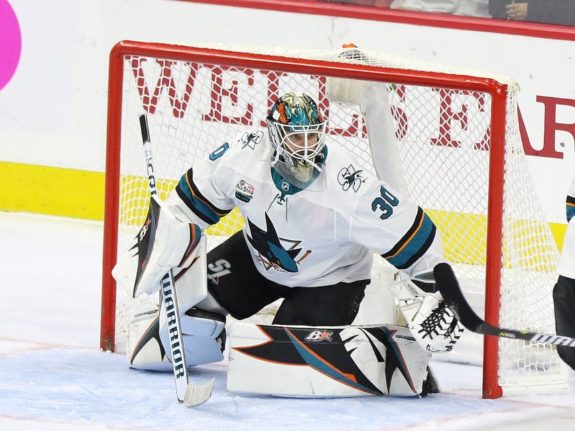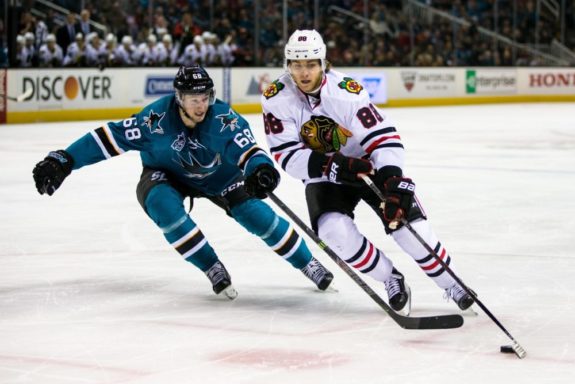![]()
The San Jose Sharks are coming off a season-long six game homestand. It concluded on Friday with a 4-0 victory over the Vancouver Canucks. Overall, the homestand proved successful with the Sharks posting a 4-1-1 mark, with a 4-0-1 record against Western Conference teams.
Now, though, the Sharks hit the road and, it seems, the trip is destined to take a toll. For starters, the schedule is dense, with 14 games (beginning with the Vancouver game) in 28 days. But this is only part of the challenge.
The Sharks have three sets of back-to-back games in the next ten days. After beating Vancouver on Friday, with Aaron Dell pitching his second consecutive shutout, the Sharks depart for Las Vegas and play the Golden Knights on Saturday.
The team heads east following the Vegas game and plays again on back-to-back nights, taking on the Buffalo Sabres on Tuesday night and the Toronto Maple Leafs on Wednesday night. The Sharks stay in eastern Canada and play, for a third time, games on consecutive nights. This back-to-back features the Ottawa Senators followed by the Montreal Canadiens.

Technically, the road trip concludes in Montreal, as the Sharks fly home after the game. But is it really the end of a trip when your “homestand” is just one game? The schedule makers have the Sharks returning home from Montreal to play the Carolina Hurricanes. This is a three hour time change heading west.
Following their game against Carolina, the Sharks’ winding road heads east, requiring a two hour time change as they travel to face the Dallas Stars. And following the Dallas game, they travel to Arizona to face the Coyotes the next night, marking the team’s fourth back-back game in a two week period.
At this point, the Sharks will have played nine games in 15 days, with every game in a different venue than the one before.
The Sharks return to San Jose for a two-game homestand (facing the New Jersey Devils and Dallas Stars), before embarking on another long distance trip (and another two-hour time change). This trip covers just two games, starting against the Chicago Blackhawks and ending against the Minnesota Wild.

On December 20, the Sharks return home to face the Winnipeg Jets. The Sharks can, at last, stop living out of suitcases.
The summary of what lies ahead isn’t pretty. Over these 28 days, the Sharks will play 14 games. Only one game will occur in the same venue as they played the game before; none of these venue changes are between ‘nearby venues’. Six times the team will make a multi-hour time zone change between games. There are four sets of back-to-back games.
Sharks Competitive Questions
The quality of competition over the next four weeks is roughly the league average, perhaps a tad above. This isn’t surprising, the Sharks will play over 40 percent of the league’s teams in this stretch (only Dallas appears twice). Eight NHL teams currently project to over 100 points, the Sharks will play four of them. No games on the upcoming trip appear easy. Conversely, there is no team on the trip which the Sharks can’t beat. Parity at it’s finest.
The Sharks coaches and players will be challenged to make the best of this grind. Plenty of questions arise for Sharks head coach Peter DeBoer. Does it make sense to play Erik Karlsson and Brent Burns 25 minutes a night in this dense portion of the schedule? Do you expose Joe Thornton and his surgically repaired knees to all the back-to-back games, knowing both times he blew out his knee, it happened on the second game of a back-to-back.

Should there be a bit more use of the lower end of roster, including players who are typically healthy scratches? Which goalie should play the lead role? Can the team overcome limited practice time?
This is, by far, the Sharks most difficult travel stretch of the season and among the most difficult in team history, even for a team accustomed to a lot of travel. If there is good news, the travel schedule over the remainder of the season is largely sane once this period is over. If the Sharks thrive during this portion of the schedule, it can provide a major tailwind for the rest of the season.
But, even if the team merely treads water, remaining in roughly in the same spot in the standings (first in the Pacific, with Calgary close behind) and on a similar points trajectory for the season (current projection 102 points), it will be a genuine accomplishment. On the other hand, a major stumble and we might just see how hot DeBoer’s seat really is.
Zeke’s Notes
• Thornton has been a milestone machine of late, crossing the 1,500 game mark and tallying his 400th goal. He was honored for these achievements prior to the game against the Canucks. During the game, Thornton dished out a pair of assists, passing Mario Lemieux for 11th on the NHL’s all-time assist list. As long as he stays healthy, the milestones should continue to roll. He needs five assists to equal Marcel Dionne for tenth place all-time. He’ll need 22 points to tie Teemu Selanne for 15th in that category. And he needs just 7 more games to join Steve Yzerman for 18th in games played.
• Four former Sharks goalies are playing in the NHL this season, three in backup roles. On Friday, the unusual happened with all four playing on the same day. James Reimer, playing for the Florida Panthers, came in for an injured Roberto Luongo but lost against Carolina. Antti Niemi manned the nets for the Montreal, eventually falling to Buffalo in overtime. In another overtime game, the New York Islanders top goalie, Thomas Greiss, helped his team defeat the New Jersey Devils. And finally, Alex Stalock led Minnesota to a win over Winnipeg. Cumulatively, they saved an impressive 128 of 138 shots for a .928 save percentage.